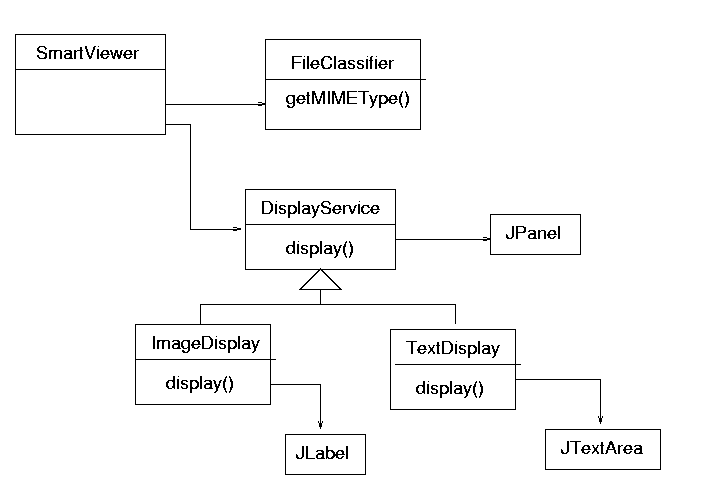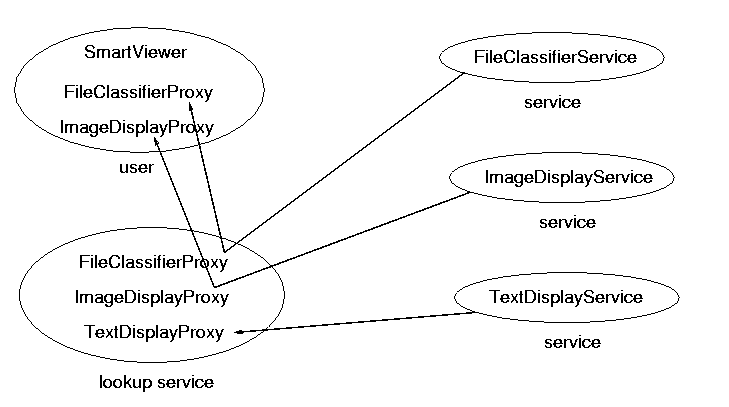Jini: A Java SOA that rocks
Jan Newmarch
jan@newmarch.name
Monash University
Demo: Flashing clocks
Eight fallacies of distributed systems
-
The network is reliable
-
Bandwidth is infinite
-
The network is secure
-
Topology doesn't change
-
There is one administrator
-
Transport cost is zero
-
The network is homogeneous
-
Latency is zero
Some middleware systems
-
Remote Procedure Call (RPC)
-
Remote method calls (CORBA)
-
Java RMI (Remote method calls through mobile proxies)
-
EJB's
-
Servlets/CGI/ASP/...
-
Web services
-
Jini
Common to (most) middleware systems
-
Separate parties communicating across the network
-
Mechanism for advertising services
-
Mechanism for discovering services
-
Defined model for interaction
-
Programming model
Jini is...
-
... a paradigm for building distributed systems
-
... a set of specifications
-
... a programming model
-
... a reference implementation
Jini as paradigm
Mantra: the network cannot be ignored
-
Failure happens - prepare for it
-
Failure happens - handle it
-
Costs are not zero - warn about them
-
Security is not an afterthought
-
The network is not under your control - define services in the abstract
and download code to implement them
Jini as specification
-
The principles of Jini can be implemented in many languages
-
But ... Jini defines one way of making these principle concrete
-
Jini defines
-
An advertisement and discovery protocol
-
Some possible interaction protocols
Jini as programming model
Jini defines a Java API for...
-
advertising Java objects as services
-
finding Java services
-
distributed leasing
-
interaction between clients and services
-
remote event model
-
transactions
-
security, security, security
Jini as reference implementation
-
Sun have supplied a reference implementation since first release
-
This has now been open-sourced (Apache license)
-
The implementation is on track to become an Apache incubator project
-
There are other implementations of parts of the Jini spec
The end of protocols
This has been in Jini since the beginning - but its importance is only slowly being realised
-
Jini moves proxy objects around the network to represent services
-
There are security implications that are addressed by Jini
-
The proxy runs locally in a client
-
The proxy communicates with the service somehow
-
Jini does not mandate the communications protocol
-
Jini proxies can use
-
JRMP (the Java RMI protocol)
-
IIOP (the CORBA protocol)
-
SOAP (the Web Services protocol)
-
Sockets, or anything else
Jini in action
Jini in action details
-
· Remote object is exported on the server side
(Produces a proxy to the remote object)
-
· Client side obtains the proxy somehow (RMI
Registry, Jini Lookup Service, UDDI, etc.)
(Code may be downloaded in the process)
-
· Execution of the call is initiated on the client side
-
· Communication between client and server occurs
-
· Execution of the call occurs on the server side
Lookup discovery and join
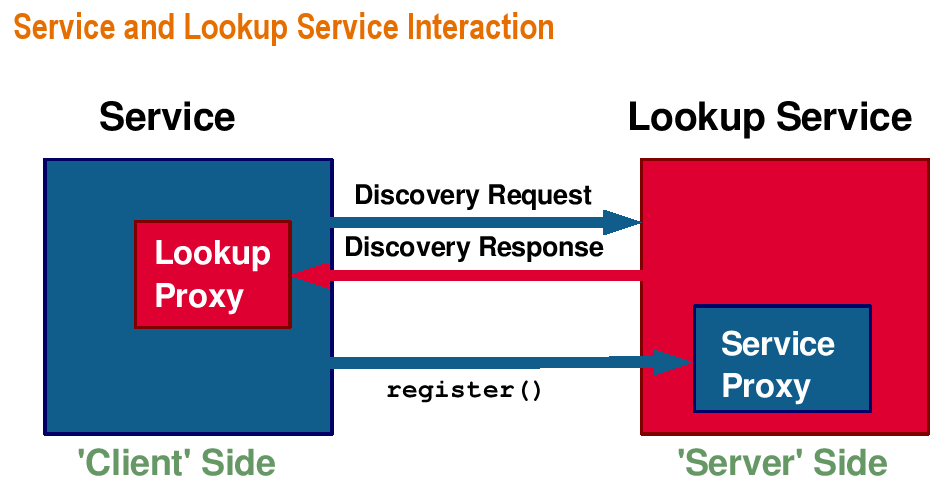
Service discovery
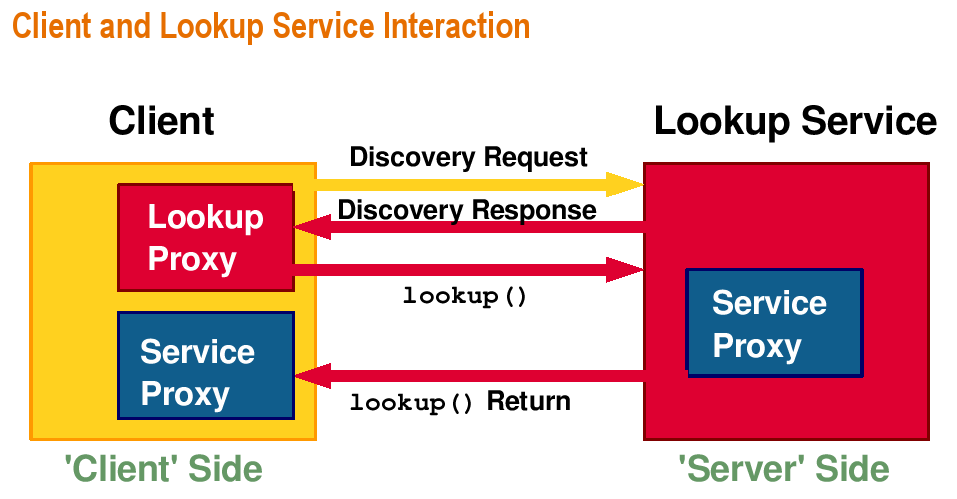
Client and service interaction
-
Code downloaded into the client side ... but client only knows
about service's public interface
-
Execution is initiated on the client side
-
Execution occurs on the service side

Support Services
-
Jini objects are moved in ``marshalled'' form
-
Class files may need to follow these for proper activation
-
The class files may need to be available from HTTP servers
-
Security permissions will need to be set using JDK 1.2
security model
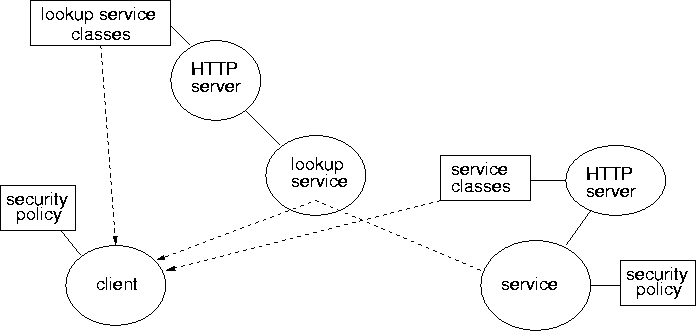
Non-distributed Application
Distributed Version
Client Structure
Internally a client will look like
prepare for discovery
|
discover a lookup service
|
prepare a template for lookup search
|
lookup a service
|
call the service
|
Server Structure
prepare for discovery
|
discover a lookup service
|
create information about a service
|
export a service
|
renew leasing periodically
|
SIMPLE SYSTEM
Jini Converter Service
-
This shows a Jini version of the
Converter service
-
It is as minimal as possible!
-
Some poor practises are used, like throwing exceptions out to the main
process
Jini Service Specification
Jini Service Implementation
Jini Server
Jini Client
Jini Environment
-
There must be a Jini lookup service running to act as the "billboard"
-
The Jini distribution contains one, called
reggie
-
An HTTP server should be running, to deliver class files
-
The converter server runs with one set of class files
-
Converter
-
ConverterImpl
-
Server
-
The converter client runs with another set of class files
-
These files should be on the HTTP server so that clients can find the class
definitions
SECURITY
JDK 1.2 Security
Service requirements
grant {
permission net.jini.discovery.DiscoveryPermission "*";
// multicast request address
permission java.net.SocketPermission "224.0.1.85", "connect,accept";
// multicast announcement address
permission java.net.SocketPermission "224.0.1.84", "connect,accept";
// RMI connections
permission java.net.SocketPermission "*.dstc.edu.au:1024-", "connect,accept";
permission java.net.SocketPermission "130.102.176.249:1024-", "connect,accept";
permission java.net.SocketPermission "127.0.0.1:1024-", "connect,accept";
// reading parameters
// like net.jini.discovery.debug!
permission java.util.PropertyPermission "net.jini.discovery.*", "read";
};
Client requirements
The client is most at risk as it imports remote objects into its address space

Client policy
grant {
permission net.jini.discovery.DiscoveryPermission "*";
// multicast request address
permission java.net.SocketPermission "224.0.1.85", "connect,accept";
// multicast announcement address
permission java.net.SocketPermission "224.0.1.84", "connect,accept";
// RMI connections
permission java.net.SocketPermission "127.0.0.1:1024-", "connect,accept";
permission java.net.SocketPermission "*.dstc.edu.au:1024-", "connect,accept";
permission java.net.SocketPermission "130.102.176.249:1024-", "connect,accept";
// DANGER
// HTTP connections - this is where external code may come in - careful!!!
permission java.net.SocketPermission "127.0.0.1:80", "connect,accept";
permission java.net.SocketPermission "*.dstc.edu.au:80", "connect,accept";
// reading parameters
// like net.jini.discovery.debug!
permission java.util.PropertyPermission "net.jini.discovery.*", "read";
};
Variations
-
If the implementation implements
Serializable
and the implementation itself is advertised, then a
copy of the service is run on the client
-
Same as above, but the copy communicates to a third party service
by e.g. SOAP
URLs
-
Jini: http://www.jini.org
-
Jini FAQ: http://www.artima.com/jini/faq.html
-
Jini tutorial: http://jan.newmarch.name/java/jini/tutorial/Jini.xml
Jan Newmarch (http://jan.newmarch.name)
jan@newmarch.name
Last modified: Sat Dec 2 23:28:45 EST 2006
Copyright ©Jan Newmarch 





